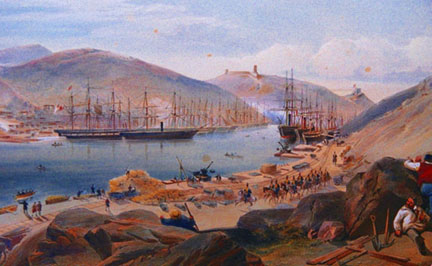The following passage comes from the author's The Destruction of Lord Raglan, (Longmans, 1961), pp. 112-13, used here with the author's kind permission. Copyright, of course, remains with Dr. Hibbert. Alvin Wee of the University Scholar's Programme, created the electronic text using OmniPage Pro OCR software, and created the HTML version. — Marjie Bloy Ph.D., Senior Research Fellow, National University of Singapore.
On the gentle sea breezes the strains of lively music came across from the French lines, and from the Turkish camps a 'sort of uncouth music with pipes, not altogether destitute of harmony'. The soft green turf was covered with blue crocuses. It was, in fact, compared with what the army had come from, 'quite a garden of Eden'.


Left: Balaclava Harbour; supply base of the British Army; defended by Sir Colin Campbell with Lord Lucan's Cavalry Division encamped close by. Balaclava Harbour; supply base of the British Army; defended by Sir Colin Campbell with Lord Lucan's Cavalry Division encamped close by by Orlando Norie (1832-1901). Source: The Anne S. K. Brown Military Collection, Brown University Library. Right: Balaclava Harbour by William Simpson. Courtesy John Sloan. [Click on images to enlarge them.]
The British headquarters were established in a 'kind of country villa with large farm buildings'. The main house, white-washed, one-storied and with a roof of red tiles, faced on to a yard in which the officers of the staff pitched their tents. The yard was enclosed at its far end by a low stone wall and on either side by cottages and sheds, now used as offices and stables, built of mud and stone. It was surrounded by six acres of vineyard. Lord Raglan in his 'little countryhouse' shared his soldiers' enthusiasm for the pleasantness of his surroundings.
But as the days of early autumn passed and the campaign seemed to have reached a standstill, the mood of the army changed. On their arrival at Balaclava they had had no doubt that Sebastopol would soon be taken after having been blown to bits by siege-guns. '48 hours will reduce it to ruins,' an officer in the Royal Fusillers cheerfully told his father. But after a week the siege-guns were nowhere near to being in position, and yet every day there seemed to be new guns firing from Sebastopol, doing little damage admittedly, but giving proof of what they could do when the allied trenches approached closer to them. Digging these trenches, parallels and zigzag approaches was in itself a hated task and had not even begun until 9 October. The ground was hard and stony under the turf, and at the end of each day the distance covered seemed absurdly small. And all the time there were those 'damned Rooskies', plainly visible through the glass. "They are working like bees, the correspondent of The Times reported. 'Women and children are carrying up earth baskets, and already the White Tower on the right of our lines is blocked up with a double line of earthworks pierced for guns.
The frustrating slowness, working on the men like an irritant, was not the only cause of their ill-temper and complaints. Within a few days the lovely countryside, prolific with fruit and vegetables, had been picked bare as if by a swarm of locusts. And the army returned to its unrelieved diet of salt meat and biscuits, the very thought of which was enough to make a man with diarrhoea or dysentery feel sick. Cholera spread again. In the hospitals in Balaclava twenty-five men a day were reported to be dying at the end of the first week, with only a little opium and rum to give them. Balaclava itself had already become a stinking, congested shambles with ships packed tightly in the harbour like leaves in a blocked drain. Piles of stores, boxes, sacks, bundles of hay, lay in muddled heaps on the quayside, and rubbish and refuse floated and stagnated in the water. Overworked commissariat officers picked their way through the muddle with bundles of forms and requisitions, invoices and inventories, doing their frantic best to bring order to the chaos; badgered at every corner by enraged regimental officers, who hated and despised them for trying to carry out their duty according to the cumbersome regulations of the Service and who accused them of all manner of dishonesty and neglect. 'That most infernal Commissariat,' Lieutenant Richards said, had converted a few derelict houses 'into what they call stores.... When anything is applied for you find Mr. Commissary Jones, Smith or Robinson smoking a cigar (which most likely has been sent out for the army but which he has bagged), who tells you that really he is very sorry; he believes that the article is somewhere in one of the stores, but where he has not the slightest idea, and at present he has no time to look for it'.
Even on the plateau above, the mess and muddle and smells in some of the camps were appalling. The streams of clear, fresh water had been trodden to mud, and it was no longer possible to wash in most of them. And as it was getting colder now, the men had little inclination to take their clothes off anyway. Some men indeed excused themselves from doing so by saying that their uniforms would not stand up to the strain. Bleached by the sun, shrunk by the rain, rubbed by equipment, used as bedclothes, torn by brambles, the clothes of many of them, worn continuously for months on end, were certainly not likely to last much longer. 'My shirt is in rags,' a Guards officer told his father as early as 7 October, 'and shoes all worn out, but we are all alike.'
Last modified 22 April 2002